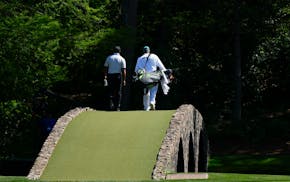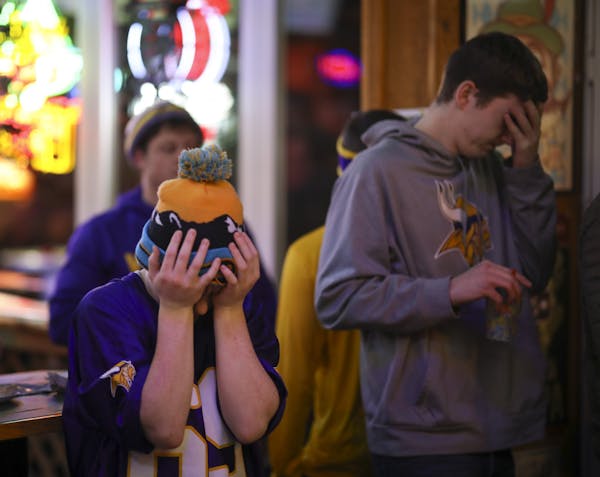PHILADELPHIA – "Bring It home," the slogan begged. Quickly that became a hashtag, then a statewide rallying cry. Bring it home, Minnesotans cheered, before executing their metronomic clap.
The slogan should have been more specific. What the Vikings brought home on the team charter late Sunday night was not a berth in the Super Bowl at U.S. Bank Stadium but a reminder of their legacy of inexplicably inept performances in big games.
After scoring a touchdown on their first possession, the Vikings collapsed, losing 38-7. By the third quarter, it was Eagles fans who were practicing the Skol chant, in jest.
"It's going to be hard to watch these guys come to Minnesota and play in our stadium,'' Vikings tight end Kyle Rudolph said.
Perhaps not as hard as watching the Vikings play in a conference title game.
The last time the Vikings played in a title game on the East Coast they lost 41-0 to the New York Giants. That game became known as 41-donut. This was 38-don't ask.
Given that the 2017 Vikings became the second team in franchise history to win 13 or more games in the regular season, this loss was more embarrassing.
This team avoided losing in the divisional round after leading 17-0 only because an opposing safety refused to make a tackle, and lost in the title game by imitating Marcus Williams' whiff. From the start of the second half vs. the Saints through the early fourth quarter on Sunday, the Vikings were outscored 62-19.
The defense should be blamed because the defense should be the team's strength. It became predictable and passive against the Saints and became sloppy and overly desperate against the Eagles.
Blame Mike Zimmer for both performances. He was hired for his defensive acumen, and the team has spent most of its resources building a defense that led the NFL statistically this season.
"I could have called a lot better game, obviously,'' Zimmer said.
"I mean, we just played trash,'' Xavier Rhodes said.
The defense, though, will not require an overhaul. The question raised by this amateurish performance concerns the quarterback position.
For all of the superlatives and testimonials hurled at Case Keenum all season, Sunday he provided a reminder of why the Vikings never openly committed to him.
In the first quarter, Keenum threw an interception that was returned for a touchdown. Not his fault? Managing the pocket, and risk, is what top quarterbacks do.
In the second quarter, Keenum lost a fumble with the Vikings in field-goal range, and the Eagles drove for a touchdown, creating at least a 10-point swing. Not his fault? Avoiding turnovers, especially when in scoring position, is what top quarterbacks do.
"I've got to step up and get away from the pass rush and be smarter,'' Keenum said.
Keenum did not look like a championship quarterback, meaning the Vikings will have a choice among three worrisome in-house candidates.
Keenum, whose ugly interception against the Saints might have become the story of the game if Williams had ended the Vikings' season a week earlier?
Teddy Bridgewater, who looked rusty in his only appearance this season and was bumped to No. 3 on the depth chart by Sam Bradford in the playoffs?
Or Bradford, who played in only one more game after Week 1 because of a knee that might be even less promising than Bridgewater's reconstruction?
"I'm not going to critique any individual players tonight,'' Zimmer said.
Before Keenum, the last four Vikings quarterbacks to play in a conference championship game were Wade Wilson, Randall Cunningham, Daunte Culpepper and Brett Favre. None ever played in a game that big again. Assuming Keenum is the QB of the future is like going back in time and predicting that Cunningham would be the Vikings quarterback of the 2000s.
Keenum either isn't the Vikings' lasting answer at quarterback, or he's going to need much more help to win a championship.
This is the Vikings' enduring legacy: losing big games, and desperately seeking quarterbacks.

Souhan: This is KAT's chance to prove Flip was right

Souhan: Why Tiger Woods should keep swinging
Souhan: Scheffler wins Masters again, shows what makes him special
Morikawa falters in final round at Masters


